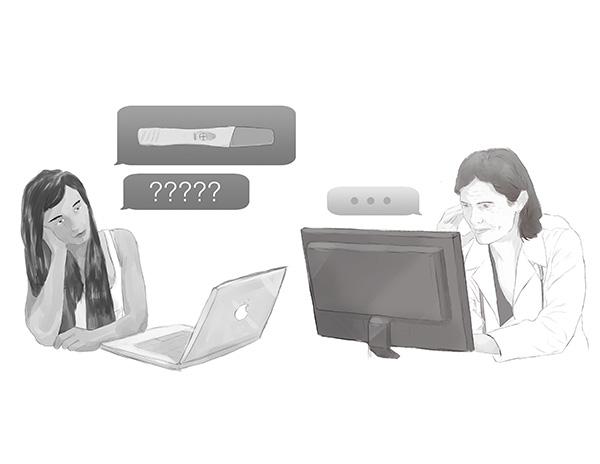 Right before they had sex, the boy Alicia was with told her that he disliked using condoms. He persuaded her that protection was unnecessary. Later, she worried that she might be pregnant. Alicia, a Palo Alto High School student whose name has been changed to protect her identity, scheduled an appointment with Planned Parenthood.
Right before they had sex, the boy Alicia was with told her that he disliked using condoms. He persuaded her that protection was unnecessary. Later, she worried that she might be pregnant. Alicia, a Palo Alto High School student whose name has been changed to protect her identity, scheduled an appointment with Planned Parenthood.
With Palo Alto Medical Foundation’s new teen capabilities on My Health Online, teens in situations like Alicia’s have another option for protecting their health and privacy.
For many years, PAMF has been pointing teens in the direction of Planned Parenthood for birth control and other reproductive health-related issues. In the past, PAMF could not guarantee privacy for teens concerned about parent snooping.
The September launch of new capabilities on My Health Online aims to ensure the health and protection of adolescent patients. My Health Online allows teens in situations similar to Alicia’s to receive confidential medical care without the fear of their parents finding out before they are ready to tell them.
My Health Online aims to maintain a complete database of medical information for patients all in one place. This is important because it allows doctors to make fully informed decisions. For example, if a teen took birth control or Plan B pills from Planned Parenthood, a doctor night not know about it. This can lead to serious consequences. A better alternative — which PAMF now provides — is to give teens the same privacy Planned Parenthood offers while keeping their medical records all in one place.
Previously, My Health Online was only available to adults for scheduling appointments, reviewing medical records and contacting their doctors. Parents could always control all of these features for their children (under the age of 12) through their own My Health Online account. PAMF’s new feature on its website allows teens to contact doctors directly and have power over their own medical records — to which parents lose access when a child turns 12. Parents can still email and make appointments for the teen with his or her primary doctor, but not access other parts of the medical record.
According to California state law, anyone over 12 can access their own medical treatment or consultation for anything related to reproductive health, substance abuse counseling or outpatient emotional health. Unlike many other online health care programs, My Health Online can be accessed by teens without the consent of their parents once a teen is authorized by a parent and sets up an account.
“In some communities, 12-year-olds may be sexually active,” says Dr. Nancy Brown, the PAMF Education Projects Manager. “They can have really, really, really dysfunctional families and need that protection at 12, so that’s the reason state law protects accounts after the age of 12, so that parents couldn’t see it.”
With this new feature, teens are encouraged to sign up for their own My Health Online account once they reach the age of 12. Their account gives them access to all of the features that were previously only accessible by their parents.
Though it is key that the site protects teens’ privacy, Brown believes it is also important to help teens transition to adult health care as well as learn to handle things such as scheduling doctor appointments when they get to college.
“I think what’s really more important is that most teens don’t do anything about their own medical condition,” Brown says. “Most of you, your parents make your appointments, we [your parents] keep up on your vaccinations, we pay your bills, we communicate with doctors, we know all of that.”
Alicia also thinks the site could help teens take charge of their own health care.
“Personally with me, I’m not very independent when it comes to things like that [medical care],” Alicia says. “My mom sets my doctor appointments, and I go with her, and we all sit in a room, and they talk to my mom and then my mom talks to me when really, I’m hearing what everyone is saying.”
The site is designed to create more efficient communication between teens and their doctors. Now, teens can directly message their doctor about anything.
“Most importantly, I’ve been struck by how many youth[s] are asking for medical advice,” Brown says.
Brown emphasizes that PAMF urges teens to communicate with their parents but ultimately, it is the child’s decision.
“We are not trying to encourage teens to not talk to their parents,” Brown says. “I think every parent in the world would rather know what’s going on than not know what’s going on, and most of our doctors will even help you tell them.”
Alicia feels that the new My Health Online feature could ease the transition parents must make as their children grow up.
“I feel like all parents, to some extent, are really uncomfortable with the idea of their kids having sex,” Alicia says. “I feel like my parents personally are still in denial about the fact that I’m almost an adult, and so I feel like this PAMF [feature] would probably be really helpful to me if something bad happened and I needed help but wasn’t comfortable talking to my parents about it.”


